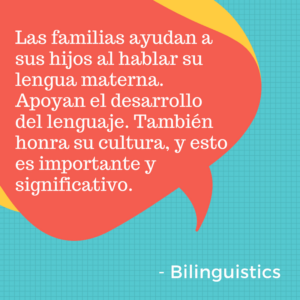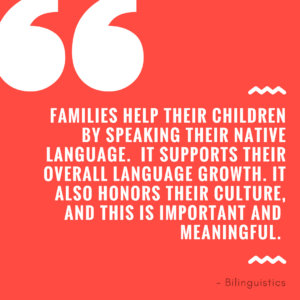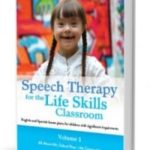Should I stop speaking my native language with my child?
In my 20+ years as a bilingual speech-language pathologist, this is the question I have heard more than any other, “Should I stop  speaking my native language with my child?” I heard it 20 years ago, and I just heard it again 20 minutes ago. Every time I hear a parent tell me that someone told them they should not speak their native tongue with their children, I cringe. I just cringe.
speaking my native language with my child?” I heard it 20 years ago, and I just heard it again 20 minutes ago. Every time I hear a parent tell me that someone told them they should not speak their native tongue with their children, I cringe. I just cringe.
Let’s Trade Places
Let’s put ourselves in the shoes of these parents for a moment. Let’s imagine that English is your native language. Your job takes you to a country where a language is spoken that you do not speak. Let’s say it’s German. You’ve listened to some German lessons, have learned some nouns and verbs, and can construct very basic sentences. Your child is enrolled in a school where German is the language of academic instruction.
You go to pick up your child at school and are speaking English with another parent when a teacher pulls you aside and tells you that you are doing your child a disservice by speaking English to him. She says, “You need to speak German with them at all times.”
You want to do right by your child. So, you commit to speak only German.

Spanish Version – Download below.
Your German, to be frank, isn’t good. Your vocabulary is limited. Your verb conjugations are incorrect, and you don’t know many descriptive words.
What kind of language model are you providing for your child?
A less-than-ideal one.
In which situation do you think your child will fare better? One in which you speak poor German or great English?
Yes, great English.
Share the Research, Please.
So, fellow blog subscribers, I am going to lay out the research that shows that it is not detrimental for children (even those with speech-language impairments) to learn more than one language.
Please share this with your team and your colleagues and physicians and administrators who work with bilingual families. Bookmark it and pull it up every time you hear someone suggest a family not use their native language with their children. Share it with your bilingual families so they can feel good about the gift they are giving their children!
Let’s get the research into people’s hands so we don’t have families being told to stop speaking their native language! If there’s a study you want me to add to this, please send me a note.
Why is it important for parents to speak their native language to their children?

English Version – Download below.
Wong-Fillmore (2000) and Portes & Hao (1998) reported that parents had difficulty supporting their children’s socialization process and there was a negative impact on the closeness and intimacy between parents and children.
A study by Tseng & Fuligni (2000) concluded that “Adolescents who conversed with their parents in different languages felt more emotionally distant from them and were less likely to engage in discussions with them than were youths who shared the same language with their parents.”
Portes & Hao (1998) found that parental language input was the strongest indicator of whether children learned to speak a home language.
DeHouwer (2007) found that in 93% of 1520 families studied, siblings demonstrated very similar levels of proficiency in the parents home language. This supports the influence that parental language input plays in children’s language development.
The benefits of bilingualism have been found to last a lifetime. Bialystok (2009) described an enhanced executive functioning and a reduced rate of decline of executive control in aging for bilinguals as compared to monolinguals.
Being able to speak more than one language is a gift. Parents, give that gift to your children.
As speech-language pathologists, we are able to support our diverse caseloads, and telling our families to continue speaking their native language is valuable. So, let’s move on to the next question.
What if my child has a language impairment or language delay? Then should I stop speaking my native language and focus on his language of instruction in school?
Gutierrez-Clellen, Simon-Cereijido & Wagner (2008) found no differences between monolingual and bilingual 4-, 5-, and 6-year-
Paradis, Crago, Genessee & Rice (2003) had similar findings when studying monolingual English-speaking children with specific language impairment (SLI), monolingual French-speaking children with SLI, and French-English simultaneous bilinguals with SLI. The bilingual children in their study appeared to have difficulties with tense marking to the same extent as the monolingual English speakers and the monolingual French speakers. In other words, learning two languages did not exacerbate their difficulties with the acquisition of verb tenses.
Feltmate & Kay-Raining Bird (2008) compared French-English bilingual children with Down Syndrome to monolingual peers. They found that, while bilingual children with Down Syndrome exhibited similar delays in both of their languages, monolingual children and bilingual children with Down Syndrome did not demonstrate significant differences. Further, the monolingual children with Down Syndrome and the and the bilingual children with down syndrome showed similar patterns of language deficits relative to their typically developing peers. They found that the introduction of a second language to children with Down Syndrome did not seem to have any detrimental effects on the children’s overall language learning. All four children in their study developed functional skills in their second language.
Kay-Raining Bird and colleagues (2005) compared the language abilities of eight children with Down Syndrome from bilingual homes to a group of monolingual controls with Down Syndrome. Their results indicated that monolingual and bilingual children with Down Syndrome have similar profiles of language abilities. They found no detrimental effect of bilingualism on language development in children with Down Syndrome.
In a study of sixty (20 monolingual and 40 bilingual) 2-to-4-year-old children with autism, Ohashi and colleagues (2012) found no differences between monolingual and bilingual children with autism on any of the language measures they explored. They included in their analysis age of first words, age of first phrases, receptive language scores, expressive language scores, and functional communication scores.
Hambly & Fombonne (2012) compared simultaneous bilingual children with autism and sequential bilingual children with autism to monolingual children with autism and found no differences between any of the groups in language level. They concluded that bilingual children did not experience any additional delays in language development as compared to monolingual peers.
In addition to these studies, Lauren Lowry of the Hanen Centre wrote a beautiful article on this topic that discusses research findings relating to simultaneous and sequential bilinguals, and majority and minority languages.
So, my friends, let’s spread the word so we don’t keep hearing this advice being given to parents 20 years from now!
(Help us spread the message. You can print our visual in English here: Speak-Native-Language-2.png (816 downloads ) . You can print out our visual in Spanish here: Speak-Native-Language-Spanish-2.png (603 downloads ) .
References
De Houwer, A. (2007). Parental language input patterns and children’s bilingual use. Applied psycholinguistics, 28(3), 411-424.
Feltmate, K., & Bird, E. K. R. (2008). Language Learning in Four Bilingual Children with Down Syndrome: A Detailed Analysis of Vocabulary and Morphosyntax L’apprentissage du langage chez quatre enfants bilingues atteints du syndrome de Down: une analyse. Revue canadienne d’orthophonie et d’audiologie-Vol, 32(1), 7.
Fillmore, L. W. (1991). When learning a second language means losing the first. Early childhood research quarterly, 6(3), 323-346.
Hambly, C., & Fombonne, E. (2012). The impact of bilingual environments on language development in children with autism spectrum disorders. Journal of Autism and Developmental Disorders, 42(7), 1342-1352.
Bird, E. K. R., Cleave, P., Trudeau, N., Thordardottir, E., Sutton, A., & Thorpe, A. (2005). The language abilities of bilingual children with Down syndrome. American Journal of Speech-Language Pathology, 14(3), 187-199.
Ohashi, J. K., Mirenda, P., Marinova-Todd, S., Hambly, C., Fombonne, E., Szatmari, P., … & Volden, J. (2012). Comparing early language development in monolingual-and bilingual-exposed young children with autism spectrum disorders. Research in Autism Spectrum Disorders, 6(2), 890-897.
Paradis, J., Crago, M., Genesee, F., & Rice, M. (2003). French-English bilingual children with SLI: How do they compare with their monolingual peers?. Journal of Speech, Language, and Hearing Research, 46(1), 113-127.
Portes, A., & Hao, L. (1998). E Pluribus Unum: Bilingualism and language loss in the second generation.Sociology of Education, 71, 269–294.



Thanks, Ellen! So handy to have this in one place to quickly reference. If I hear one more time “He has a disability and can’t handle two languages so let’s just move him from dual language instruction to English only. It will be easier with just one language” (when the child is Spanish dominant), I may just lose it. I hear that all of the time, even from bilingual evaluation staff. Eye roll.
Thank you, Gina. That’s EXACTLY why I wrote this article. Show them the research!
Thank you for this short/sweet article! Already sent a mass email out to our elementary school! I plan to send it again before the next school year begins as well.
You are welcome, Angela. Thank you so much for sharing. We all need to be vocal and share the research to change the way so many people respond to this issue. I don’t think people realize how much language is a part of a family’s identity and culture. It’s far more easily said than done to just stop using your native tongue with your child.
Awesome!!!!! Love this
Thanks, Karen. Share it with your colleagues and families
This is related to a topic that we struggle with in our districts in San Antonio, which is language of academic placement. Often, we see children from Spanish speaking families that are assessed and diagnosed with language delays in both Spanish and English, and there are some that show a dominance toward English and stronger language and articulation skills in English with greater deficits in Spanish. In a situation like this, our SLPs often recommend moving these students from a Spanish classroom (that has a short lesson in English daily) to a monolingual English classroom, while encouraging parent to speak their native language at home. The argument is that we want to build upon academic progress with their stronger language. On the other hand, our language proficiency assessment committees (LPAC) advocate for keeping these children in the Spanish speaking classrooms. I can see the validity of both sides, but I struggle with which is a better decision for these types students, who are at risk for academic difficulties. Do you have any ways of considering the language of academic placement?
Thanks for your article!
I remember reading something Kathryn Kohnert wrote a few years ago in which she said that monolingualism is not a cure for a learning disability. I know that people are not really attempting to “cure” a learning disability or language disorder with a monolingual environment but I do see that this is a common suggestion for bilingual students who are struggling academically. Just like language disorders, students who have learning difficulties do not exhibit those difficulties in just one language. So the support we give them should really address bigger skills that can be used in both languages (memory strategies, visualization-verbalization, sentence-building,…). These students are bilingual because of their circumstances, and we can’t change those circumstances so if we have a program that can support their learning in both languages, I would argue that that is a good placement for them.
I also want to speak to your comment about showing a dominance toward English. Bilingual children use their two languages in very different settings. Let’s take a child from a Spanish-speaking home as an example. They will talk about very different things in Spanish in the home setting than they will in English at school. If their exposure to academic concepts has been in English, they will likely express those concepts best in English. If you ask them about an experience they have in the home setting, they will likely discuss that best in Spanish. Given this, I think we need to be very cautious about declaring one language as the “dominant” language, especially with respect to making classroom placement decisions.
And finally, I want to add that I think it is very important that we include parents in our discussions about classroom placement. Some parents are adamant that they want their children in English-only programs, others want their children in bilingual programs. Their input matters a lot. I have sat in special education meetings where a paper has been put in front of a parent to sign with someone saying, “We think an English-only placement is best for your child. Please sign here.” Their signature denies bilingual education for their child. We need to include parents in the conversation, tell them what bilingual education looks like, tell them how long bilingual education is available in our districts, what happens when it ends, etc. When we lay the facts on the table and get input from all of the caring parties, we’ll end up with a good decision.
For sequential bilingual students with SLI, that are enrolled in a dual-language classrooms, it seems we need to recommend keeping them in there for the purpose of supporting L1. I’m all aboard. However, if speech therapy is in L2 (monolingual SLP), student receives ESL classes (English only), and most tier 2/tier 3 language support is in English does the same still apply?
Hi Josh, You bring up an issue that many of us face on a regular basis. This is especially true when we consider children whose first language is not Spanish or Vietnamese. For those students, dual language programs with their native language and English are rarely an option. In this case, I would certainly still encourage the family to continue using the home language in the home. For the educational specialists supporting that student, I would encourage them to gain an understanding of the similarities and differences between English and their native language. Our Difference or Disorder book addresses this for 12 different languages. Once we know what the structure and sound system of the student’s native language is, we can select goals that can impact development in both languages. There is a free resource (Language Milestones) on our website that provides information about the development of language skills that are similar across languages.
What if it is the other way around, parents refusing bilingual evaluation or with an interpreter or bilingual services?
Hi Rebeca,
Good questions. For evaluations, we are ethically bound to consider all of a child’s languages in an evaluation. Without consideration of all of the languages they are regularly exposed to, we cannot make a confident diagnostic decision about a child’s language skills. So, a parent may refuse an evaluation altogether but if they want their child’s speech and language skills evaluated, we need to consider their whole language profile. Sometimes that means we need to pull in an interpreter.
As for bilingual services, a parent’s denial of bilingual education services does not mean that we cannot provide bilingual speech therapy. Explaining to parents that we are better able to support a child’s overall language development if we focus on deficits in both their home language and school language is a good place to start. If, after you have done that, a parent really does not want intervention in the home language, it is best to select targets that will impact both languages. There is a segment on this in our online course: Difference or Disorder: Language Development…
Thanks, Ellen! Much like you, I’ve been advocating for evidence-based recommendations for 18 years, and I appreciate Bilinguistics’ intensive labor to keep these issues “in our faces” and for resources to combat the pervading myths that just don’t seem to die! I recently read that resources from “experience and the heart” are “an unbeatable combination,” so I thoroughly appreciate the plethora of Bilinguistics resources. There’s not a single presentation or lecture I give in the area of bilingualism and bilingual speech-language pathology without quoting or sharing a Bilinguistics resource.
The bottom line is that the optimal language of interaction is the caregiver’s heart language (most dominant language), and we CANNOT take that away from families. My family has lived in the U.S. for THIRTY years, and I literally have NEVER had a conversation with my parents in English…it’s just awkward and unnatural for us. Portuguese is and always will be our heart language! That dynamic is so hard to explain, but it’s a reality that we can’t ignore just because it’s more convenient and “easier” in the educational setting to switch to English. THANK YOU, THANK YOU, THANK YOU for this article!
Thank you, Ana Paula. Well said! I love the idea of the heart language.
I was just asked this by a colleague, specifically about a student who spoke a native language from Africa at home. The early intervention social worker recommended they speak English (poorly) at home versus the well developed home languages (French was the other home language). This is exactly what I told her to tell the parents in her meeting, and I was happy to share widely this morning.
Hi Meghan, So glad you are sharing this to help this student and his family. This is the reason I wrote this post. I want it to be easy for us to show WHY we encourage families to speak their native tongue with their children.
Thank-you for this information. Do you have the visual available in Vietnamese? And Cambodian?
Hi Roberta,
Phuong Palafox is working on the Vietnamese version and she will reach out to you when it is ready. We don’t have one in Cambodian.
Thanks! <3
I’d be very interested to know how this advice applies to an elective bilingual family where the minority language spoken is non-native to either/both parents. Presumably it’s a matter of linguistic competency as to whether the choice to speak their L2 is a good or bad idea. But, if so, where is that cut Off point?
I’d be very interested to know how this advice applies to an elective bilingual family where the minority language spoken is non-native to either/both parents. Presumably it’s a matter of linguistic competency as to whether the choice to speak their L2 is a good or bad idea. But, if so, where is that cut Off point?
That’s a good point. What is important is that children have a good language model. The situation you mention is a decision to expose children to a second language, and I think that’s great. This describes my household. My husband and I are both native English speakers who speak Spanish as our second language. Our children hear English more than Spanish but they hear some Spanish every day. They have excellent receptive and expressive skills in English and mediocre receptive and expressive language skills in Spanish. I know there are many families who speak their L2 with native-like proficiency and would be great language models. The point of my initial post was that many families are told not to speak their L1, when that is their richest language.
I am delighted to see this article and the general interest in bilingual language development on this website. As a parent, it is very hard to get information on this subject, especially if you have a child with a language impairment. My daughter, now age 21, was finally diagnosed at age 17 with “expressive language disorder.” She was raised speaking American English and Swiss German. Her school langauge was standard High German. Her teachers always attributed her school difficulties to being bi-lingual..”if you only worked on her German, she’d be fine.” She’s not fine…she has exactly the same difficulties is ALL her languages.
Hi Peggy,
Thank you for sharing your story.
I just wish you had been armed with this information years ago! This also speaks to the importance of listening to the concerns of the parents of our students.
All my best–Ellen
I’m not sure if message is too late or not, but the answer is no. No, you should not stop speaking your native language to your children. Why? It has been found that bilingual and multilingual children/ people in the future will be cognitively smarter. Also, while children are at school they will automatically learn the country language. So, it is suggested only your native language be spoken at home. You and your children will be thankful later. Thank you
Never too late!
Such people don’t know – or rather don’t care -that they’re depriving their children of learning a language that will be expensive, and they will probably never sound like natives. What I understand is, parents who speak said 2nd language in the house don’t want their own language skills to decline, and if their speech is less than optimal, or there are bits they don’t understand, they can just turn to their children (which is pretty pitiful when you think about it).
Let’s compare it with partners/spouses who don’t talk the national language with a live-in partner who really needs to learn it. Great, fine, they imrpove their English skills, but when it comes to said foreign spouse having to ‘dance and tell jokes’ in another language (very often family members DON’T know English) it’s always awkward.
Language use in the home is such an individual-family decision. It is hard in education as we are trying to take a snapshot of an evolving several-year process and say, on a specific day, if a child needs extra help. There is so much outside pressure to conform. This is why I don’t speak Lithuanian or German despite my grandparents speaking it fluently. We can be the voice of support by sharing the importance of providing the best language model, whichever language it is.
Thank you for the image download! I put both English and Spanish images on the bottom of my email signature 🙂